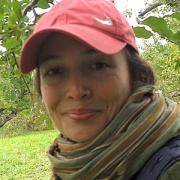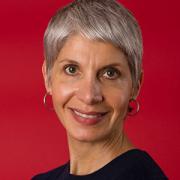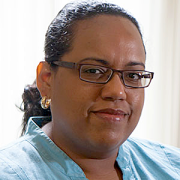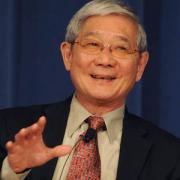ANNOUNCEMENTS
Recent articles published by Postdoctoral Fellow and Visiting Assistant Professor Jallicia Jolly

Opinion Piece on May 27, 2021 - "I survived childbirth during three pandemics - COVID, racism, and Black maternal health crisis"
First Person Perspective “A Black doctor died after childbirth. 4 years later, her mother and daughter are still living with the grief. Living the daily toll of this heartache is the aftermath of maternal mortality.”
An Ample Voice for Asian American Studies

Presidential Teaching Professorships
President Biddy Martin has been raising funds for a rotating three-year Presidential Teaching Professorship to recognize the college's most distinguished scholar/teacher. Two of the College's new highest honors have been awarded to two department faculty members:

Lisa Brooks has been awarded the Henry S. Poler '59 Presidential Teaching Scholarship.
.
Image


Leah Schmalzbauer has been awarded the Conway Presidential Teaching Professorship.
Summer Research Fellowship

Postdoctoral Fellow and Visiting Assistant Professor Jallicia Jolly was awarded an American Association of University Women summer research fellowship.
Guggenheim Foundation Awards Prestigious Fellowship to Amherst College Professor Lisa Brooks
The English and American studies professor will research the environmental history of eastern coyotes and their adaptation to climate catastrophes and colonization.
(Amherst, Mass., April 29, 2020) – Lisa Brooks, professor of English and American studies at Amherst College, has been awarded a prestigious fellowship from the John Simon Guggenheim Memorial Foundation. Brooks is one of just 175 writers, scholars, artists and scientists from a pool of 3,000 applicants this year to receive the award, which is based on prior achievement and future promise.
In all, 53 scholarly disciplines and artistic fields, 75 different academic institutions, 31 states and the District of Columbia, and two Canadian provinces are represented among the 2020 Guggenheim Fellows, who range in age from 29 to 82.
“It’s exceptionally encouraging to be able to share such positive news at this terribly challenging time,” said Edward Hirsch, president of the Guggenheim Foundation. “The artists, writers, scholars and scientific researchers supported by the fellowship will help us understand and learn from what we are enduring individually and collectively, and it is an honor for the Foundation to help them do their essential work.”
“We are immensely fortunate that Lisa is a member of our faculty,” said Catherine Epstein, provost and dean of the faculty at Amherst. “Her work in Native American studies is outstanding, and we’re excited to see how the Guggenheim Fellowship will enable her studies in a new direction. Having greatly enjoyed [her 2018 book,] Our Beloved Kin, I very much look forward to what she creates next.”
Brooks’ new project, titled “Tracking Molsemsis: An Indigenous and Environmental History of Eastern Coyote,” will “center Indigenous methodologies in an environmental history of coyotes and their kin, mapping their adaptation to climate catastrophes and colonization.”
“The main question behind the book I will write is: What do we have to learn from eastern coyote (Molsemsis, or ‘little wolf’) about adapting to radical environmental change, including change caused by human beings?” Brooks said. In answering that important question, she intends to address others, such as: “How can we learn to be better relatives, as so many Indigenous stories convey, to our other-than-human kin? How can we transform our approaches to ‘solving’ environmental challenges so that we are looking to learn from these kin and not just imposing our solutions upon them and their environments? What happens if we frame the history of this continent by centering coyotes and Coyote stories? What kind of alternative future will we, with Coyote as a companion, be able to conceive?”
Brooks said the idea for the book came about as a result of her “side project,” tracking eastern coyotes in the woods around her home and in the region, reading numerous books on the animals and scouring scientific databases for information about coyotes’ remarkable adaptability, driven by her own “coyote-like curiosity.” Those experiences will serve Brooks well in her research for the project: she plans to continue tracking coyotes and consulting trackers in the region.
She said she will also tap into the extensive scholarship about coyote and wolf genetics, biology and ecology; visit Wabanaki communities in Maine and Vermont to listen to new coyote stories and older stories about wolves; track western coyotes and wolves in areas of the Pacific Northwest where wolves have returned; pursue research and conversation in archives and tribal museums; and immerse herself in the coyote stories that can be found Amherst College’s Kim-Wait/Eisenberg Native American Literature Collection and in ongoing exchange with other Native scholars who work with these literatures.
“For a long time, I have wanted to write a book that can clarify that adaptation to climate change is not possible without deep, reciprocal engagement with Indigenous communities and Traditional Ecological Knowledge, as well as deep, reciprocal engagement with the animals and plants who are constantly engaged in making the space we call home, whether we are aware of it or not,” Brooks said. “It will be a story about the capacity for adapting to catastrophic change and the threat of extermination, from which we all have much to learn.”
Created by Sen. Simon and Olga Guggenheim in memory of their son, the John Simon Guggenheim Memorial Foundation has sought to “further the development of scholars and artists by assisting them to engage in research in any field of knowledge and creation in any of the arts, under the freest possible conditions.” Since its founding in 1925, it has granted more than $375 million in fellowships to over 18,000 individuals, among whom are scores of Nobel laureates; poets laureate; and winners of the Pulitzer Prize, Turing Award, Bancroft Prize, National Book Award and other internationally recognized honors. For more information on the organization and the 2020 Guggenheim Fellows, visit gf.org.
Amherst College prepares students to use ideas to make a difference in the world. Since its founding in 1821 in Western Massachusetts, Amherst has demonstrated steadfast confidence in the value of the liberal arts and the importance of critical thinking. Today, its financial aid program is among the most substantial in the nation, and its student body is among the most diverse. Small classes, an open curriculum and a singular focus on undergraduate education ensure that leading scholars engage daily with talented, curious students, equipping them for leadership in an increasingly global and complex world. The College will celebrate its bicentennial in 2021.
Books
Lisa Brooks’ new book, Our Beloved Kin (Yale, 2018), will be honored with the Neal Allen Award, from the Maine Historical Society. This award is presented each year at the annual meeting for exceptional contributions to Maine history.
Our Beloved Kin was recently reviewed in the Portland Herald and the Wall Street Journal, along with Mount Holyoke College professor Christine Delucia’s book, The Memory Lands.
Brooks recently published an essay in the William and Mary Quarterly, as part of a Joint Forum, "Materials and Methods in Native American and Indigenous Studies" (Volume 75, no. 2), that is jointly published with Early American Literature. The Forum consists of an introductory essay and seven articles, three of which are published in EAL and four in the WMQ. Prof. Brooks’ essay is entitled “Awikhigawôgan ta Pildowi Ôjmowôgan: Mapping a New History.”
In May, Prof. Brooks will be doing an interview for Ben Franklin’s World podcast, which should be available soon at https://www.benfranklinsworld.com




